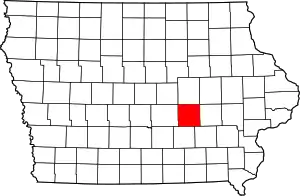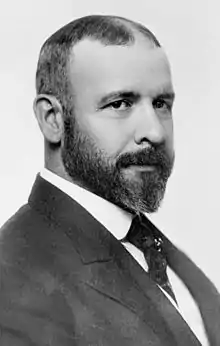Merchants' National Bank
The Merchants' National Bank (1914) building is a historic commercial building located in Grinnell, Iowa. It is one of a series of small banks designed by Louis Sullivan in the Midwest between 1909 and 1919. All of the banks are built of brick and for this structure he employed various shades of brick, ranging in color from blue-black to golden brown, giving it an overall reddish brown appearance. It was declared a National Historic Landmark in 1976 for its architecture.[2][3] In 1991 it was listed as a contributing property in the Grinnell Historic Commercial District.[4]
Merchants' National Bank | |
 Merchants' National Bank | |
| Location | 833 Fourth Avenue, Grinnell, Iowa |
|---|---|
| Coordinates | 41°44′36″N 92°43′27.75″W |
| Built | 1914 |
| Architect | Louis Sullivan; Stewart-Robison-Laffan |
| Architectural style | Late 19th And Early 20th Century American Movements |
| Part of | Grinnell Historic Commercial District (ID91000384) |
| NRHP reference No. | 76000804 |
| Significant dates | |
| Added to NRHP | January 7, 1976[1] |
| Designated CP | January 7, 1976[2] |
Description and history
Merchants' National Bank was built in 1914 and had its grand opening on January the first, in 1915, along with the Purdue State Bank in Indiana, also designed by Sullivan.[5]
Structurally the building is a rectangular box, with a magnificent main facade and a windowed side facade.
Although this building is smaller than either his Owatonna or Cedar Rapids banks it appears just as monumental. This is due largely to the oversized cartouche that surrounds a circular window on the Fourth Street facade. Light is introduced into the interior by a series of stained glass windows that alternate with structural posts down the side of the building and through the colored glass skylight that comprises much of the ceiling.
While the bank housed the structure and its location, the small town of Grinnell did not warrant national attention. Yet the unveiling of the Louis Sullivan building was given national coverage in the architectural press of the day. The Merchants' Bank was thus featured in an eleven-page spread in The Western Architect's February 1916 edition.[6]
As he did in his banks in Cedar Rapids and Sidney, Ohio, Sullivan used lions, or at least a grotesque, winged version of a lion, as figurative decoration. This creature is one of the very few figurative elements that can be found in the architect's designs. (The angels in his Transportation Building and the Bayard-Condict Building being other examples.)
Some of the plans and even the designs of the ornament were done by Sullivan's draftsman Parker N. Berry, who was shortly thereafter to fall victim to the 1918 Spanish flu epidemic.
In the 1970s or early 1980s, a city beautification project sponsored the planting of several trees in front of the bank. Gebhard calls this an "unbelievable decision" for the growing plants would obscure more and more of the amazing facade. These plantings can be easily seen in the gallery pictures, taken in 1985. These trees were removed as of 2013.
In 2007, the city remodeled its downtown sidewalks and streets so the intersections of the square had the "Jewelbox" appearance to them. The city also put Planters at the four corners of the crossings which have the "Jewelbox" engraved in them.
Between 2008 and 2009, one of the lions in front of the building was damaged. Both lions have now been replaced.
Images
 Photo of the Merchants National Bank entrance with gold winged lions, Grinnell, IA
Photo of the Merchants National Bank entrance with gold winged lions, Grinnell, IA Main facade
Main facade
 Over front entrance
Over front entrance
 Detail of cartouche
Detail of cartouche Sign over side door.
Sign over side door. Door molding
Door molding windows
windows
Other Louis Sullivan "jewel boxes"
- Farmers and Merchants Bank, Columbus, Wisconsin (1919)
- Henry Adams Building, Algona, Iowa (1913)
- Home Building Association Company, Newark, Ohio (1914)
- National Farmer's Bank, Owatonna, Minnesota (1908)
- People's Federal Savings and Loan Association, Sidney, Ohio (1918)
- Peoples Savings Bank, Cedar Rapids, Iowa (1912)
- Purdue State Bank, West Lafayette, Indiana (1914)
See also
Sources
- Brooks, H. Allen, The Prairie School: Frank Lloyd Wright and His Contemporaries, University of Toronto Press, Toronto, Ontario, 1972
- Elia, Mario Manieri, Louis Henry Sullivan, Princeton Architectural Press, Princeton NY, 1996
- Gebhard, David & Gerald Mansheim, Building of Iowa, Oxford University Press, New York, 1993
- Kvaran, Einar Einarsson, The Louis Sullivan Pilgrimage, unpublished manuscript
- Morrison, Hugh, "Louis Sullivan: Prophet of Modern Architecture", W.W. Norton and Company, New York, 1963
- Twombly, Robert, Louis Sullivan: His Life and Work, Elizabeth Sifton Books - Viking, New York, 1986
- Wilson, Richard Guy and Sidney K. Robinson, The Prairie School in Iowa, Iowa State University Press, Ames, Iowa, 1977
References
| Wikimedia Commons has media related to Merchants' National Bank. |
- "National Register Information System". National Register of Historic Places. National Park Service. January 23, 2007.
- "Merchants' National Bank". National Historic Landmark summary listing. National Park Service. Archived from the original on 2006-10-13. Retrieved 2007-10-10.
- Carolyn Pitts (July 1975). "National Register of Historic Places Inventory-Nomination: Merchants' National Bank / Poweshiek County National Bank" (pdf). National Park Service. Cite journal requires
|journal=(help) and Accompanying 7 photos, exterior and interior, from 1978 and undated. (1.73 MB) - W.C. Page. "Grinnell Historic Commercial District". National Park Service. Retrieved 2016-04-16.
- Louis Sullivan's Merchants National Bank. Pomegranate Communications, Inc. 2007. p. 1. ISBN 978-0764940408.
- American Architect and Architecture, Volume 109. The American Architect. January–June 1916. pp. 246–247.

